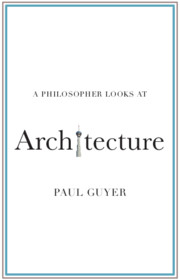Book contents
- A Philosopher Looks at Architecture
- A Philosopher Looks at
- A Philosopher Looks at Architecture
- Copyright page
- Contents
- List of Figures
- Introduction
- 1 Good Construction, Functionality, and Aesthetic Appeal
- 2 The Meaning of Beauty
- 3 Multiplicity of Meaning in Twentieth-Century Theories
- 4 Words and Works
- 5 Looking Forward
- Notes
- Index
3 - Multiplicity of Meaning in Twentieth-Century Theories
Published online by Cambridge University Press: 20 May 2021
- A Philosopher Looks at Architecture
- A Philosopher Looks at
- A Philosopher Looks at Architecture
- Copyright page
- Contents
- List of Figures
- Introduction
- 1 Good Construction, Functionality, and Aesthetic Appeal
- 2 The Meaning of Beauty
- 3 Multiplicity of Meaning in Twentieth-Century Theories
- 4 Words and Works
- 5 Looking Forward
- Notes
- Index
Summary
This chapter considers linguistic and phenomenological approaches in recent architectural theory. It argues that the analogy of architectural language is imperfect, and any plausible use of it has to include semantic and pragmatic as well as syntactic dimensions. The phenomenological approach to architecture pioneered by Rasmussen and recently developed by Steven Holl in both his writings and his work has to take account of function and construction as well as the aesthetics of the experience of architecture.
Keywords
- Type
- Chapter
- Information
- A Philosopher Looks at Architecture , pp. 98 - 126Publisher: Cambridge University PressPrint publication year: 2021

